Isle of Man, The Greatest Tax Haven?
Politics / Taxes Feb 02, 2010 - 02:37 AM GMTBy: LewRockwell
 Nathan Blevins writes:The Call of Ellan Vannin - Freedom isn’t some fanciful creature of the imagination, like Bigfoot. It actually exists, and I’ve seen it. For in the year of our Lord, 2006, I had the marvellous privilege of fulfilling a lifelong personal dream: the dream of travelling to an enchanted place I’d always wished to visit. Well, perhaps I’d not held the dream that long. For you see, it was roughly 6 or 7 years ago that I was reading some smashing stuff from fellow liberty lover, Ron Holland, when I happened upon a trivia question of his that gave me pause:
Nathan Blevins writes:The Call of Ellan Vannin - Freedom isn’t some fanciful creature of the imagination, like Bigfoot. It actually exists, and I’ve seen it. For in the year of our Lord, 2006, I had the marvellous privilege of fulfilling a lifelong personal dream: the dream of travelling to an enchanted place I’d always wished to visit. Well, perhaps I’d not held the dream that long. For you see, it was roughly 6 or 7 years ago that I was reading some smashing stuff from fellow liberty lover, Ron Holland, when I happened upon a trivia question of his that gave me pause:
"What country has the world’s oldest, continuously functioning parliament?"
Wow, talk about being intrigued...and flummoxed. Imagine my dilemma. Here I was, an honor student who recently graduated with a major in history/political-science, and I couldn’t even tell you what the world’s oldest parliament was. So, after sitting at my desk, hopelessly straining for an answer for what seemed like hours (probably 4 or 5 minutes), I swallowed my pride, and clicked on the answer. Thus began a love affair I’ve had with this special land ever since.
Where is this place? Ah, a fair enough question. One man, my cabbie, who drove me to my hotel there, laughingly said that some folk abroad derided his homeland as nothing more than "a rock in the middle of the Irish sea, that 80,000 people desperately cling to." Ah, but rest assured...those detractors are wrong, for the Isle of Man is ever so much more than that.
On the contrary, it is a place of timeless tradition, whose proud people nourish a culture of freedom and peace that defies any effort to stamp it out or subjugate it. Take for instance its motto: "Quocunque Jeceris Stabit." Roughly translated, it means, "Whithersoever you throw it, it will stand." That is aptly put. For ever since the days when Julius Caesar himself referred to it as "Mona," the tiny isle has been under periodic threat of invasion. Though the Manx people have fiercely resisted numerous invasions of their homeland, sadly the Isle of Man has never been able to maintain its total autonomy and independence for very long. It finally was occupied by the Vikings first, followed by the Scotch, and then, lastly, the English. Many occupiers have come and gone, but this all-important fact remains, with a lesson for all would-be empires of our time: those armies are all gone, yet the people of Man are still there. Aptly put indeed, though violently tossed about through the storms of time, the island has stood.
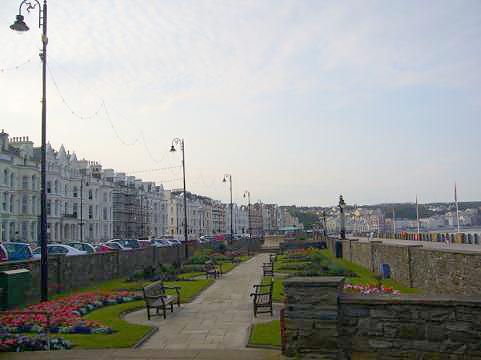
The Promenade in Douglas, Man’s capital city
What Freedom Looks Like
I can remember arriving in Douglas, the capital city of Man, and walking out the hotel doors to behold the beautiful promenade stretch down the coastline for a full two miles. Breathing the salty sea air, I was awestruck to see scarcely a spot which a beautiful Victorian villa or structure didn’t grace. Elegance was all around, and yet it was all so understated, so humble and unassuming. I couldn’t help but smile, thinking of the great prosperity that their Christian faith and their desire for liberty had brought them. Looking back, I can definitely say that one of the main reasons I’ve come to love the Isle of Man, and wanted to visit it in the first place, is that it’s a place of great liberty. Now, at the risk of sounding like a man who slices liberty up into little areas of life (which we know is defunct, since liberty is all-encompassing), I couldn’t help but notice the prosperity that a liberty-minded tax policy brought the people of Man. This place is a living testament to the fact that lower taxes mean more prosperity. Consider a few examples of the Manx peoples’ attitude to taxes:
- They impose no capital gains tax.
- They impose no wealth tax.
- They impose no inheritance tax.
- They impose no corporate tax (except for banks, which is at 10%).
- Their income tax caps off at 18%, and stops after an individual has paid a maximum of 100,000 Pounds in one year (200,000 if filing jointly).
Now, at this point, I’ll just bet that most people reading this might wonder how such prosperity is tolerated in the E.U.
"Wouldn’t they immediately stamp this poor little economy into the mud with mountains of ‘wondrous and progressive’ regulations, taxes, and fees? This place just smacks of a target for the envious, power-hungry bureaucrats of Brussels and London to sink their fiscal fangs into. Why hasn’t the E.U. taxed them into an economic stone age paradise like the rest of Europe?"
Come on, admit it, you were thinking that, weren’t you?
Ah, but therein lies the Isle of Man’s great secret to their success: they are neither part of the E.U., nor are they part of the United Kingdom. Allow me to explain.
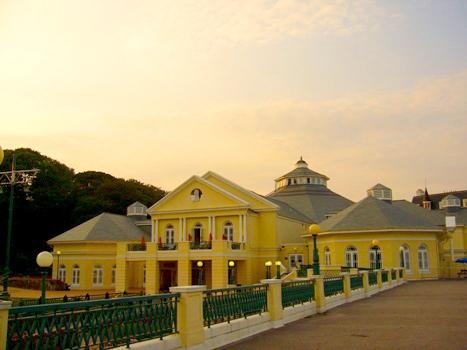
The Villa Marina, along the Promenade in Douglas, which together with the Gaiety Theatre, are the national theatre of the Manx nation
For a while, during the late Middle Ages, the island was under English feudal governance, yet since 1764 when it was revested to the Queen of England, the Isle of Man has belonged to the British Crown. To this very day, the Queen is considered "the Lord of Man." It is a unique governance arrangement that only a few other lands share with the British Royalty. This peculiar arrangement is called a "Crown Dependency," and though the Queen still technically owns Man, the land itself remains independent in that it is not part of the United Kingdom. Furthermore, no law that is passed in the U.K. applies to Man unless the island is specifically named in the legislation. They have their own tax system, their own version of the British Pound (used exclusively on their island), their own postal system, and their own parliament. To make the situation even more deliciously sweet, under the Treaty of Rome, the Manx people can ship goods to and from Europe free from any tariffs. Bottom line: they still play "God Save the Queen" when Her Majesty is on the island, but in matters of actual governance, the Manx people call the shots. Glorious.
Now, things aren’t always as they should be in Man though, due to the few laws that do end up being applied to them from Westminster. For instance, the infamous 1997 Firearms Act, which greatly restricts gun ownership rights, also applies on the Isle of Man. In addition, the Manx are also required to participate in the awful VAT system. The VAT, or "value added tax," which is similar to our sales tax, has just been raised in many parts of Britain from 15% to 17.5%, proving to be a deadweight on the local economies. By the way, is it just me, or can anyone think of a worse name for a tax than this one? I know it’s meant to tax a good when value has been added, but a person casually reading it might subconsciously think that the tax adds actual value. Since when has a tax ever added anything to a good or service other than undesirability?
All in all though, if compared with the rest of Europe, the Crown Dependency arrangement, however imperfect, has been largely beneficial for the Manx people. One has to wonder why this remarkably successful home-rule experiment isn’t tried more often in other parts of the world (Tibet, maybe? Come on China, whaddaya have to lose?). True, by libertarian standards it would be a baby step toward real freedom, but maybe, just maybe in an age defined by clarion calls for progressive totalitarianism, it just might be the slow working antidote we need to counter decades of legislative poison.
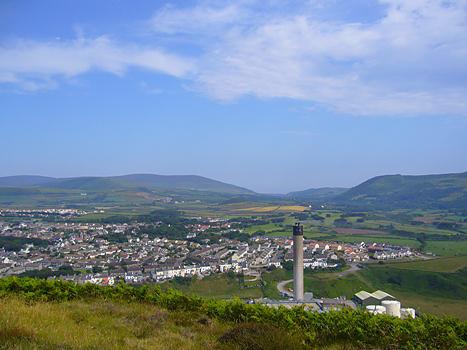
The picturesque town of Peel
A Land that Nurtures Ritual
Another precious virtue that sets the Isle of Man apart is that it is a land of enduring tradition. It was my keen desire to observe those traditions, particularly their civic traditions, in action. Their parliament, for example, as noted earlier, is the world’s oldest continuously functioning one. Now, a good-natured citizen from Iceland might argue that perhaps their parliament (based on many of the same Norse models) might be older, but theirs has had a few blips in its governance along the way. However, the Manx parliament, called Tynwald, dates as far back as A.D. 979, and is not just a government for the Manx; it’s a way of life.
The key thing which makes Tynwald so different than other parliaments is the ceremony their parliament presides over annually on Tynwald Day or National Manx Day, as it is sometimes called. It is best described by a conversation I happened to overhear between the President of Tynwald, Mr. Noel Quayle Cringle, and a news reporter. When asked to describe the Tynwald ceremony, Mr. Cringle responded venerably thus: "tis an ancient civic ceremony, equal parts spectacle and ritual."
Held in the normally sleepy little town of St. John’s, the Tynwald ceremony makes the whole community come alive every July 5th. I watched as the people at St. John’s gaily celebrated with folk dancing, games, and eating. There was such a festive, happy mood in the air that day, that I found myself whisked up in its energy like leaves in the wind.
As we watched the procession begin, all the members of state that were present went into the Royal Chapel of St. John the Baptist, the Manx national chapel, for a worship service (which the entire throng outside can participate in if they so desire, by watching it on a televised screen as it is taped live within the chapel). After the worship service had been conducted, all those within the chapel headed down the pathway to Tynwald Hill.

Tynwald Hill looking toward St. John’s
The person who proceeded out first was the national sword bearer, who carried the Manx national sword of state. The sword is a symbol of the Manx nation, and though no one is sure of its origin, it has been dated to at least the 12th century, and is believed to have belonged to the last Viking King of Man, Olaf Godredson. Behind the sword bearer, followed the Queen’s representative, the Lieutenant Governor, as he walked the path, and ascended Tynwald Hill, followed by the members of the House of Keys and the Legislative Council.
The scene is something to behold. First of all, Tynwald Hill is shaped as 4 circular steps rising up to the final step, where the Manx flag is planted. The flag rises up through a huge pavilion during this ceremony which covers the entire hill. Here’s where it really begins to get fascinating though. Once all are seated atop the hill, two Deemsters (law readers), clad in their robes and long wigs, begin to read aloud every single law that the Tynwald parliament has passed during the previous year. All of them. The first Deemster reads them aloud in English, and the second reads them aloud in their native language, Manx Gaelic.
"Talk about transparency!" I thought to myself. "Is there anything more transparent than having to go out into the very heart of the people and tell them every single piece of legislation you passed for the past 12 months?"
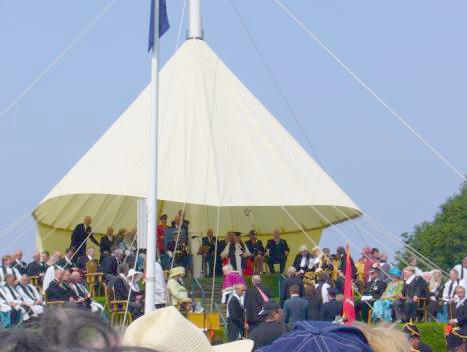
Tynwald Hill with all Manx heads of state
Sadly though, while such a ceremony would be a huge improvement if conducted in the United States, it would be logistically impossible, due to the fact that our legislators (be they federal, state, or local) feel as if they aren’t doing their jobs if they don’t pass a bajillion laws. It is a tragic commentary on the current political climate in America, when the Manx reading of an entire year’s laws are almost shorter than our President’s state of the union address!
Before I knew it, the reading seemed over with before it had begun, for in the previous year of 2005, they’d only passed a whopping 7 laws. It took less than two hours to read them all, even while reading them in two languages!
After the formalities were finished, the parliament left the hill to convene over any unsettled business. Once finished, they adjourned for the summer, not reconvening until October, nearly 4 months later. Don’t you wish our legislators did, well, a lot less legislating? Wouldn’t the world be a better place if they did? Think about it. I’d gladly double all congressional salaries if, in return, they agreed to vacation for 3 to 6 months a year, and just leave us alone. What a bargain that would be!
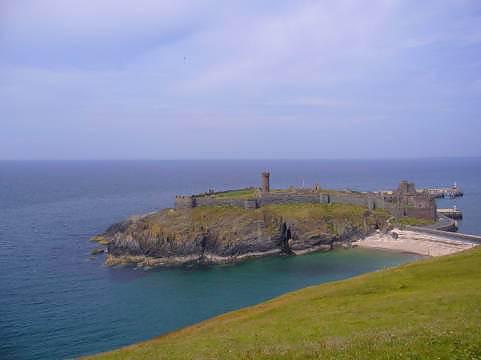
St. Patrick’s Isle just off Peel, by oral tradition, is where St. Patrick landed and made his HQ as he witnessed to the Manx people
After the ceremony was over with, I wandered over to a local pub with a strange, bittersweet feeling that kept nagging me. I couldn’t figure out quite what it was. Awhile later, while pondering it all over a pint of Okells (the official beer of Man), I finally put my finger on what was bothering me, and in that moment I discovered something about myself too. It was the first time I’d been away from the U.S. on July 4th. I wasn’t merely absent though. I was away from the U.S. on its Independence Day to specifically celebrate another country’s Independence Day. At first I couldn’t help but feel a bit guilty, but then I realized that it had been many years since I felt there was anything worth celebrating on July 4th anyway, except memories of events and times that happened long before I was born.
Americans, if they’re honest with themselves, will admit that most meaningful freedoms have been gone for a long time, while the rest are disappearing at alarming rates. Perhaps I came to this land to see what real freedom looked like again; to see something living and present worth celebrating, not just memories of "auld lang syne." I yearn for a time in America, when we can do more than wistfully remember better days which occurred hundreds of years ago, but actually enjoy better days right now, and look forward to making better days in the years to come. Alas, and yet, as we patiently await and labor for our freedoms, even as we struggle for them, let it be said of us as it is said of the Manx: "Whithersoever you throw them, they will stand."
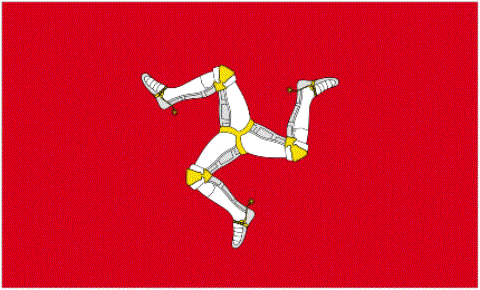
The Manx Triskelion, the national flag of Man
February 2, 2010
Nathan Blevins [send him mail] lives in the scenic Smokey Mountains of east Tennessee with his lovely wife Courtney, and their son James.
© 2010 Copyright Nathan Blevins / LewRockwell.com - All Rights Reserved
Disclaimer: The above is a matter of opinion provided for general information purposes only and is not intended as investment advice. Information and analysis above are derived from sources and utilising methods believed to be reliable, but we cannot accept responsibility for any losses you may incur as a result of this analysis. Individuals should consult with their personal financial advisors.
© 2005-2022 http://www.MarketOracle.co.uk - The Market Oracle is a FREE Daily Financial Markets Analysis & Forecasting online publication.



